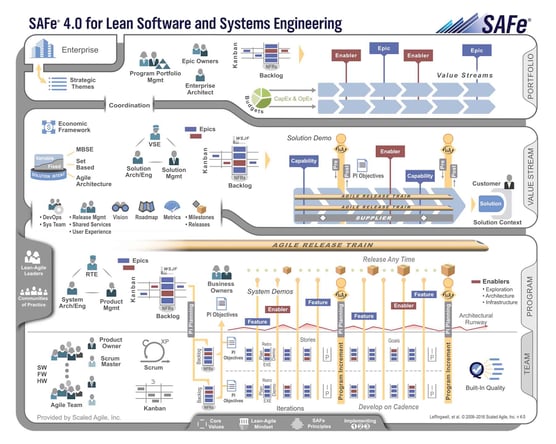Scaling Lean Operations in a Large Organization
Software Development Lean 16-08-22 Modev Staff 5 min read

Whether piloting a new program or managing smaller agile teams in your organization, there will come a time when success necessitates growth. And growth can be a terrifying prospect. It can negate the benefits of those smaller operations, reduce efficiency in the system you’ve created, or create new problems not foreseen during the pilot.
That’s a why a careful approach to scaling of lean operations is so important, especially in a large organization for which resource availability is not an issue.
Process Development is Key
When scaling a small operation within your organization, there are several advantages. You have the opportunity to build from scratch a system that is efficient and maintains the integrity of your original vision, all within an agile framework. It’s a lot easier to build something from scratch the way you want it to operate than to overhaul a system already running at full steam.
And process development is key to making this happen. Knowing in advance how you want your systems to work, who is responsible for each component of a system, and what the teams that will be executing these processes look like is vital. Cross-functional teams working towards previously defined goals within the structure of your operation can make all the difference.
Scrum of Scrums
For those using scrum as part of their agile framework for a small team, it can work at scale by adopting a multi-team stand-up as part of ‘scrum of scrums’. This involves selecting a single member from each team to represent them in the scrum of scrum meeting, ideally someone in a technical role.
This meeting is short (no more than 15 minutes), should encourage knowledge sharing and status updates between teams, and should be action oriented. This is not a status meeting and should be kept as lean as anything else. These meetings should be focused on a single work theme, not an epic or release (these are separate meetings). As your organization grows, you may also find that incorporating your sprint planning and retrospectives into a scrum of scrum can be effective as well to avoid blocking dependencies and addressing pain points in real time.
Minimize Complexity
For a large organization, resources are generally not a problem if a program is successful. If your operation achieves its revenue and growth goals, budget will be allocated. The real risk of bottleneck comes when a system is over-complicated or stuffed with too many decision makers that slow down progress.
Organic growth of your work processes can lead to overlapping workflows, a lack of clear best practices, convoluted training, and a boat load of complexity that increases the likelihood of failure or bottleneck. This means having in place a system that works well with a model for how it can be completed in full by a single team. By packaging a process in a single lean operation, you can more effectively scale that operation in the future without having to overhaul the workflow.
Scaled Agile Framework
The scaled agile framework, developed by Dean Leffingwell, is a more structured approach to agile at scale than scrum of scrums and works well in larger organizations. It develops three levels – portfolio, program, and team – utilizing a familiar tiered system within the agile framework.
The goal of this system is to map large areas of work that is related into themes as business and architectural epics. In this model, a business epic is a customer-focused project such as a product launch. Architectural epics are company tech projects such as infrastructure updates or software changes.
You can see and explore the full framework on http://scaledagileframework.com/.
The goal here is to create a system that supports multiple teams working across a portfolio simultaneously without the risk of siloing or increase of unnecessary dependencies bottlenecking a project. Large organizations tend to prefer this approach because it can integrate into existing structure and is more structured than a scrum of scrums model.
Automation
Lean operation is about focusing on core competencies and what makes the product special. That means outsourcing or automating any non-core business practices wherever possible.
It is easier now than ever before to automate the vast majority of processes. Whether through internal systems or via software that manages accounting, sales, marketing, or communications integration, there is a tool for just about anything these days. If your company is saddled with outdated legacy systems, find ways to streamline your operations around those systems, or push to implement new solutions at a low cost when the system is new.
Outsourcing can be as simple as leveraging cross-functional team in your organization for production of resources your team shouldn’t be focused on, or bringing in outside consultants to help with key areas for which you do not have any standalone experts on staff.
Document Everything
As your operation grows, processes will evolve and grow to match the needs of your employees, stakeholders, and customers. Document all of it.
For most organizations, documentation becomes a seemingly unnecessary beaurocratic logjam. Recording hours, tracking daily activities, and jotting memos to countless stakeholders who probably won’t read them in full.
But for a growing operation, proper documentation can shave off hours of unproductive time each week, streamline your operations, and ensure you remain lean as you grow. When there are 10 people on your team, it’s easy enough to just talk to one another and share information. What about when there are 30? 50? 100? Can information be easily shared across the team without diluting its importance or relevance to each task?
Proper documentation early ensures every member of your team shares the same values and ethic, while at the same time reducing wasted time from new employees asking the same questions over and over again.
Find a balance between organic operation and proper process documentation and you’ll reduce wasted efforts and help your new staff more quickly integrate with your team.
Keeping Your Operations Lean Regardless of Growth
With the right mindset, your operations can remain lean, unimpeded by bloated processes, and unclear communication. No matter the size of your company, a smart approach to lean scale up will keep your team happy and growth on point.
Learn more about the challenges of scaling a lean operation in a large organization at the EXO Software Summit from Oita Coleman from SAS, September 14-16. Request your invitation now.
